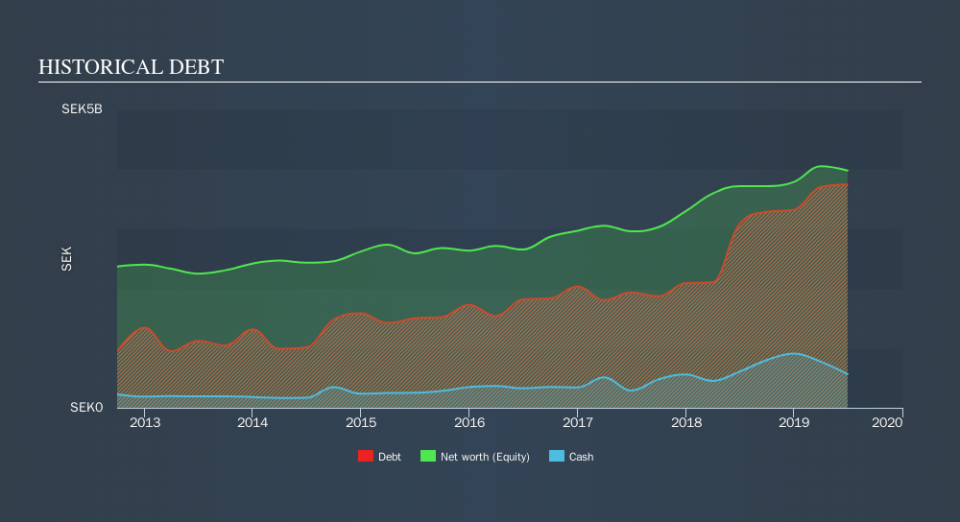Is Beijer Ref (STO:BEIJ B) Using Too Much Debt?

Legendary fund manager Li Lu (who Charlie Munger backed) once said, 'The biggest investment risk is not the volatility of prices, but whether you will suffer a permanent loss of capital.' It's only natural to consider a company's balance sheet when you examine how risky it is, since debt is often involved when a business collapses. Importantly, Beijer Ref AB (publ) (STO:BEIJ B) does carry debt. But the more important question is: how much risk is that debt creating?
When Is Debt A Problem?
Debt and other liabilities become risky for a business when it cannot easily fulfill those obligations, either with free cash flow or by raising capital at an attractive price. If things get really bad, the lenders can take control of the business. However, a more usual (but still expensive) situation is where a company must dilute shareholders at a cheap share price simply to get debt under control. By replacing dilution, though, debt can be an extremely good tool for businesses that need capital to invest in growth at high rates of return. The first thing to do when considering how much debt a business uses is to look at its cash and debt together.
Check out our latest analysis for Beijer Ref
How Much Debt Does Beijer Ref Carry?
As you can see below, at the end of June 2019, Beijer Ref had kr3.74b of debt, up from kr3.07b a year ago. Click the image for more detail. However, it does have kr565.0m in cash offsetting this, leading to net debt of about kr3.18b.
How Strong Is Beijer Ref's Balance Sheet?
We can see from the most recent balance sheet that Beijer Ref had liabilities of kr4.20b falling due within a year, and liabilities of kr3.74b due beyond that. Offsetting these obligations, it had cash of kr565.0m as well as receivables valued at kr3.53b due within 12 months. So its liabilities total kr3.84b more than the combination of its cash and short-term receivables.
Since publicly traded Beijer Ref shares are worth a total of kr29.3b, it seems unlikely that this level of liabilities would be a major threat. However, we do think it is worth keeping an eye on its balance sheet strength, as it may change over time.
We measure a company's debt load relative to its earnings power by looking at its net debt divided by its earnings before interest, tax, depreciation, and amortization (EBITDA) and by calculating how easily its earnings before interest and tax (EBIT) cover its interest expense (interest cover). This way, we consider both the absolute quantum of the debt, as well as the interest rates paid on it.
Beijer Ref's net debt to EBITDA ratio of about 2.5 suggests only moderate use of debt. And its strong interest cover of 20.1 times, makes us even more comfortable. Also relevant is that Beijer Ref has grown its EBIT by a very respectable 30% in the last year, thus enhancing its ability to pay down debt. When analysing debt levels, the balance sheet is the obvious place to start. But it is future earnings, more than anything, that will determine Beijer Ref's ability to maintain a healthy balance sheet going forward. So if you're focused on the future you can check out this free report showing analyst profit forecasts.
Finally, while the tax-man may adore accounting profits, lenders only accept cold hard cash. So we clearly need to look at whether that EBIT is leading to corresponding free cash flow. In the last three years, Beijer Ref's free cash flow amounted to 45% of its EBIT, less than we'd expect. That's not great, when it comes to paying down debt.
Our View
The good news is that Beijer Ref's demonstrated ability to cover its interest expense with its EBIT delights us like a fluffy puppy does a toddler. But, on a more sombre note, we are a little concerned by its net debt to EBITDA. Taking all this data into account, it seems to us that Beijer Ref takes a pretty sensible approach to debt. While that brings some risk, it can also enhance returns for shareholders. We'd be motivated to research the stock further if we found out that Beijer Ref insiders have bought shares recently. If you would too, then you're in luck, since today we're sharing our list of reported insider transactions for free.
If you're interested in investing in businesses that can grow profits without the burden of debt, then check out this free list of growing businesses that have net cash on the balance sheet.
We aim to bring you long-term focused research analysis driven by fundamental data. Note that our analysis may not factor in the latest price-sensitive company announcements or qualitative material.
If you spot an error that warrants correction, please contact the editor at editorial-team@simplywallst.com. This article by Simply Wall St is general in nature. It does not constitute a recommendation to buy or sell any stock, and does not take account of your objectives, or your financial situation. Simply Wall St has no position in the stocks mentioned. Thank you for reading.

